
The Gentlemen is regressive, possibly racist, occasionally hard to understand, and stuffed to the gills with very famous people making some bizarre acting choices. It's a Guy Ritchie movie produced by beIN Media Group, the Qatar-based entertainment conglomerate that now owns the Miramax brand name, and distributed by STX, a struggling indie label that went begging hat in hand last year to Saudi Arabia for emergency capital to keep the lights on. Give it a couple more years and movies like The Gentlemen won't exist anymore, at least not as a theatrical release.
Yet, we can still have a lot of fun at the wake. Somewhat against my better judgment, I enjoyed The Gentlemen. It's a real case of Guy Ritchie making "one for me." What about the "one for them," though? Before we get to The Gentlemen, we have to talk about Aladdin.
A Whole New Old World
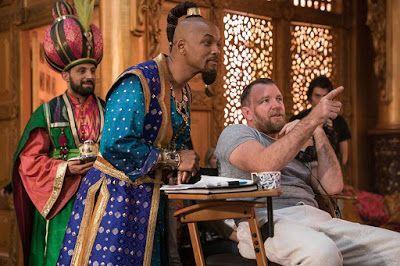
Among cinephiles, one of the biggest headscratchers of 2019 was why exactly Guy Ritchie - the man who first arrived on the scene in the late 90s and helmed a series of gangsters movies as if he was the British Tarantino - agreed to direct a live-action remake of Disney's Aladdin. Was it simply a paycheck gig? An act of career desperation after two consecutive big-budget bombs ( the underrated Man from U.N.C.L.E., the astonishingly terrible, practically unfinished King Arthur: Legend of the Sword)? Or, like so many other directors, had he secretly always wanted to make a musical?
Cynically, you can assume his recent cold streak had at least something to do with it. ( How quickly we forget that King Arthur ran neck-and-neck with John Carter for the title "biggest box office bomb of all time.") To hear Ritchie tell it, however, he simply caught the same bug so many other filmmakers do as they get older: he wanted to make something for his kids. "I have five children. The films I spend the majority of my time watching are family films, and because of that it just feels very of my moment to be immersed in family films," the 51-year-old director told EW while promoting Aladdin. "My kids spent quite a lot of time on set. I can tell you that they know every word to every song in the movie already."
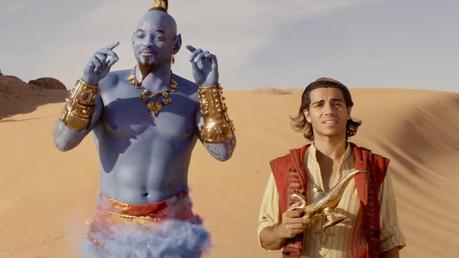
If true, commendable, and while I obviously I can't speak for his kids I can share that my nieces and nephew loved Ritchie's version of Aladdin. They all prefer it over the animated original. (Sacrilege, if you're a cinephile; I like the newer thing because it looks and sounds more like the movies I'm used to, if you're a kid.)
They also couldn't tell me who directed it. It doesn't matter to them who made Aladdin the same way they don't care who makes the Marvel movies. They've seen enough movies to know Disney will always find a way to keep the trains running on time, regardless of whether a director puts a lot of their own personal style into a specific project or matter-of-factly focuses on getting their x number of shots per day. Ritchie felt like a guy doing the latter on Aladdin.
A Back to Basics Album
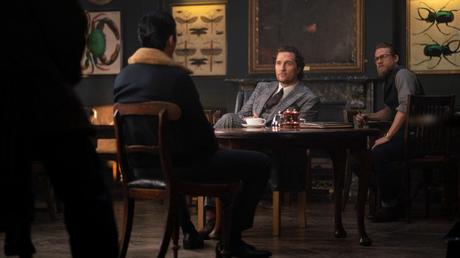
That's why you'd probably assume Ritchie's next project, The Gentlemen, would be overflowing with whip pans and look-at-me showmanship. He's always been a hypercaffeinated director, and after mostly checking himself at the door for Aladdin he surely must have crazy ideas practically spilling out of his pores. After all, as infamous Hollywood sage Ben Affleck once said, "You gotta do the safe picture. Then you can do the art picture."
While I'd hardly call The Gentlemen an art picture, it's certainly a truer expression of Ritchie's artistic instincts than Aladdin. It's, as you can guess from the Snatch-esque poster, a total throwback project. Starting with 2009's Sherlock Holmes, Ritchie spent an entire decade doing nothing but IP adaptations. The Gentlemen turns back the clock to before all of that, fondly calling back to Ritchie's days as a gangster movie connoisseur with heavy leanings toward black comedy and a fondness for large ensembles.
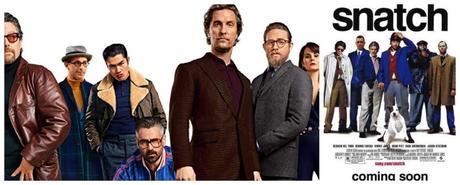
In this case, Ritchie spins a tale about the old (Matthew McConaughey's three-days-from-retirement alpha male Mickey Pearson) fighting the young (Hendry Golding's big talker nicknamed Dry Eye) in a war over Britain's literally underground marijuana industry. Key periphery figures include: Mickey's cockney wife (Michelle Dockery), his loyal right-hand man Ray (Charlie Hunnam), an American buyer with big pockets (Jeremy Strong), a boxing trainer sucked into the turf war (Colin Farrell), a tabloid publisher with an axe to grind (Eddie Marsan), and an amoral paparazzi named Fletcher looking to sell the story to the highest bidder (Hugh Grant).
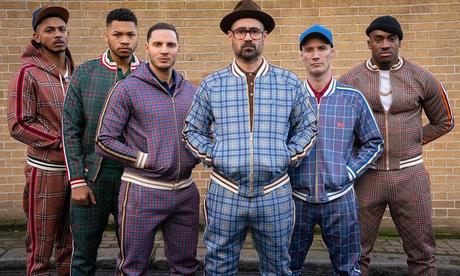
It's aggressively Guy Ritchie. Every part of it, from Colin Farrell not caring if anyone can understand his dialogue to the unapologetic swearing (the c-word pops up early and often) to the WTF quirk of Dockery's character owning a high-end auto body shop that only has one male employee and exclusively caters to female customers looking to get their car detailed before hitting up spin class.
Hugh Grant's Renaissance Continues
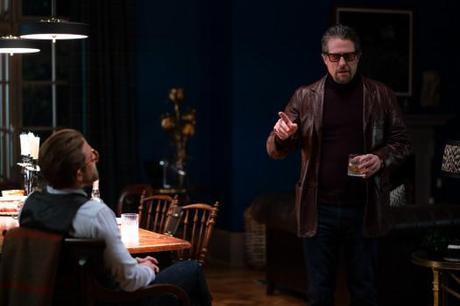
Even with all of that, however, this is also Ritchie pulling back a little. Apart from a couple of gimmicky on-screen moments, Ritchie ditches his usual camera tricks in favor of screenplay quirks. After a cold open featuring Mickey monologuing at a bar about being a lion as if McConaughey was just reading lines from one of his Lincoln commercials, somebody appears to shoot our apparent protagonist in the back of the head. A Bond-esque opening credits sequence follows before we meet Fletcher (Grant at his most amoral and oddly lovable) and Ray (Hunnam at his most restrained).
We don't know if we're now squarely in flashback mode or if this is actually happening after Mickey's fateful day at that bar. We don't really know how Fletcher and Ray even know each other, but when Ray sees that Fletcher has broken into his home in the middle of the night he's annoyed, sure, but not entirely shocked. This is a shakedown, and Ray seems to know it. Fletcher is there to share everything he's learned about Mickey's criminal operation and reveal how much it will cost to keep him quiet.
So Meta
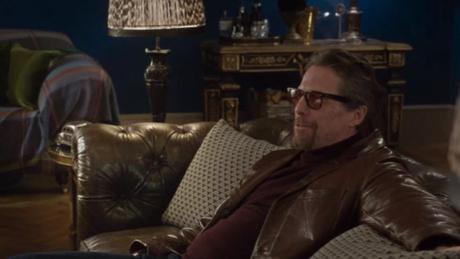
There's a catch, though: Fletcher has also adapted all of this into a movie script. So, when he describes the details of the gang war to Ray - thus throwing us to flashbacks - he can't help but frame everything as if it was a movie. As such, whenever the action gets a tad boring he's all too happy to toss in a bit of gratuitous violence, even as Ray protests, "That's not how it happened." Similarly, when the dialogue seems a tad too cliched or the characterizations rely on cheap stereotypes we know it's because we're getting Fletcher's lowest-common-denominator film script version of things, as Ray sometimes, but not always points out.
This gives Ritchie plenty of room to play around with unreliable narrator tropes while also working in multiple layers of tension, first in the flashback sequences charting the growing war between Mickey and Dry Eye but also back in the gorgeous mansion where Fletcher is gleefully laying out every little detail. Are we sure Fletcher is telling us everything he knows? Ray sure seems patient and calm about all of this, but might this night end with him killing Fletcher? And Ritchie didn't seriously spoil Mickey's death in the first scene? Surely there's going to be some twist with that, right?
If none of that really does it for you, the performances are quirky enough to hold your interest. The Big Picture podcast described the acting in The Gentlemen as "a bunch of famous people working for scale and deciding, fuck it, I'm going to have some fun," and that's exactly what it feels like. Jeremy Strong and Hugh Grant both make the choice to play their characters as sexually fluid. Dockery wears her Cockney accent with effortless pride. McConaughey is just sticking with his Lincoln car commercial voice the whole way through and it oddly works. Golding's joy at playing something other than a rom-com guy is palpable. Hunnam embodies the straight man in the story 90% of the time because he knows in that other 10% he gets to monologue over some drug dealers like Samuel L. Jackson in Pulp Fiction.
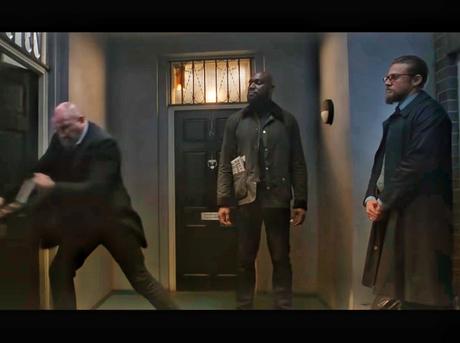
The Pulp Fiction comparison feels apt since The Gentlemen plays like Guy Ritchie's nostalgic throwback to a time when Tarantino impressions were par for the course. This also means refusing to shy away from problematic language/stereotypes and occasional crudeness, which might rub some the wrong way. (There's an attempted rape scene so out-of-nowhere I was sure Fletcher was about to cut into the flashback and admit he made it up, but, alas, that never happens.)
However, I found more here to like than to dislike. Sometimes, really, it's just fun to go the movies and watch a bunch of famous people rub elbows from within the confines of a fairly familiar genre and wait to see how the various story dots connect. When that comes with a performance as memorable as Hugh Grant's in The Gentlemen, I'm going to walk away happy. Of course, it's not the type of film my nieces and nephew want to see. That's okay. The Gentlemen is R-Rated, after all. Also, they already have Aladdin.
What's your take on The Gentlemen? Or Aladdin? Or Guy Ritchie in general? Let me know in the comments.

